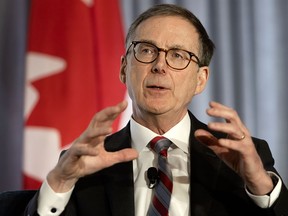Some members argued to pause until there was more clarity on impact of Donald Trump’s tariffs

Article content
The Bank of Canada would have held its policy rate at three per cent in March in the absence of trade uncertainty with the United States, according to a summary of deliberations leading up to the decision released by the central bank on Wednesday.
Article content
Article content
“While members (of the governing council) expressed some differences on how the unexpected economic strength in the second half of 2024 influenced their assessment of risks, there was general agreement that the new data had shifted the balance, with somewhat less risk of lower inflation outcomes,” the summary said. “They agreed that, in the absence of tariff threats and elevated uncertainty, the decision would probably have been to maintain the policy interest rate at three per cent.”
Advertisement 2
Article content
The bank ultimately decided to cut the policy rate by 25 basis points, bringing the rate down to 2.75 per cent.
During the announcement, Bank of Canada governor Tiff Macklem said the economic impact of U.S. tariffs “could be severe,” depending on their duration.
U.S. President Donald Trump imposed 25 per cent tariffs on Canadian steel and aluminum imports on March 12 and is set to announce reciprocal tariffs on all countries on April 2. It remains unclear whether Canadian goods exempted under the Canada-U.S.-Mexico Agreement (CUSMA) will remain exempted from tariffs beyond that date.
The minutes reveal some members argued to hold the rate, while others argued the trade risks to the outlook were enough to justify another cut.
“Some members suggested that it could still be appropriate to maintain the policy rate at three per cent until there is more clarity around tariffs and more information about their macroeconomic impact,” the deliberations said. “Other members suggested that the threat of tariffs and uncertainty had changed the outlook enough to warrant a further reduction in the policy rate.”
Article content
Advertisement 3
Article content
Governing council members also discussed at length how sources of uncertainty like the trade conflict, responses by governments, business and consumer spending will weigh on economic growth.
“How all these forces interact and impact the economy can only be assessed over time as information becomes available. Members noted that the situation was complex and fluid,” the minutes said. “Still, what seemed most likely was that the trade conflict would weigh on economic activity while also increasing inflationary pressures.”
These impacts include could include disruption to the Canadian labour market, which was showing signs of recovery prior to the trade uncertainty.
“Trade tensions and the imposition of tariffs were expected to disrupt a recovery in the labour market,” the summary said. “Members noted a decline in job postings. Recent Bank survey results indicated that businesses intended to reduce the pace of hiring in the near term.”
Advertisement 4
Article content
As for the inflation outlook, the governing council agreed to monitor the pass-through costs of tariffs on inflation, but noted it remains too early to see the impacts in the data.
“They noted that the extent and speed of the pass-through to consumer prices was uncertain and will require careful tracking,” the deliberations said. “They agreed to closely monitor the evolution of medium- and long-term inflation expectations, as anchored expectations are key to ensuring that any rise in inflation is temporary.”
Recommended from Editorial
• Email: jgowling@postmedia.com
Bookmark our website and support our journalism: Don’t miss the business news you need to know — add financialpost.com to your bookmarks and sign up for our newsletters here.
Article content



